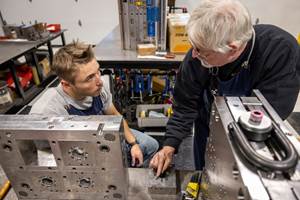Steve Rotman: Championing for Apprenticeship Training
There is no question that Steve Rotman, President of Mooresville, NC-based Ameritech Die & Mold, Inc. is passionate about the industry.
There is no question that Steve Rotman, President of Mooresville, NC-based Ameritech Die & Mold, Inc. is passionate about the industry. In addition to running a successful mold shop, he also has served as AMBA president for the past 18 months. So, it should come as no surprise that Rotman is a crusader on a mission to bring new talent to the moldmaking industry.
Through Ameritech Die & Mold, Rotman was instrumental in developing a unique apprenticeship program called Apprenticeship 2000, which allows apprentices to work for their sponsor company while earning a Manufacturing Technology Degree (AAS) at Central Piedmont Community College (CPCC; Charlotte, NC). Plus, Rotman takes every opportunity he can to speak to young people about the many benefits of choosing a career in manufacturing.
On A Mission
Rotman’s most recent “recruitment” efforts occurred at a local high school, where more than 700 businesspeople, students and parents attended an Economic Summit meeting in Mooresville, NC on Election Day. This joint effort between local industry and Mooresville High School was developed to help students integrate into the workforce. Rotman spoke about apprenticeship and training initiatives.
Topics covered at this summit were how to apply for jobs, resumes, attitudes, dress, what to do/not do, classes to take in order to be better prepared for a profession, and shadowing opportunities. “I had so many positive, engaging conversations with 8th to 12th grade students, all looking intensely for something that struck their interest, as well as talents,” Rotman recalls. “Then there were parents with questions and discussion of the pros and cons of two- versus four-year degree programs. It was very enlightening for me, as well as the student and parents. I am amazed at how trends in society continually change, the perception of education versus the job market. They are continually adjusting, and what used to be a ‘four-year degree only’ mentality has changed to trying to really understand how to get a job tied to that degree—if even possible.
“My son has friends that graduated with him two years ago that have yet to find a career within their fields of expertise, so now some of them are just going on to get their Masters because they have not been able to be placed as of yet,” Rotman continues. “My son joined the company upon graduating with a Business Degree, and is working on the floor—learning machining and managing the first-year apprentices.”
Fostering Apprentices
The Apprenticeship 2000 program is a four-year, European style training program established in 1995 by a select group of companies—of which Ameritech belongs—to address the shortage of younger moldmakers. Interested students are recruited at area high schools, and then invited to an open house. After that, students attend an orientation to build a take-home project with the trainers at the sponsor companies. The best students then enter a six-week summer internship program. At the same time, the sponsor companies evaluate the candidates' potential and offer the best candidates an apprenticeship.
Over the course of the school year, students attend their high school classes for the first half of the day, and then work in their sponsor company the other half. Once they graduation, the apprentices become full-time employees—working four days per week and attending college one day per week. In addition, they must attend one evening class. Once the basics are learned, the apprentices may choose one of five specialties: CNC machinist, mold/plastics technician, quality technician, machine technician or tool and die maker.
"With our apprenticeship program, we keep the Ameritech philosophy and knowledge at the forefront," Rotman states. “We were all apprentices at one time or another. Finding that next moldmaking protégé is my passion. It is so rewarding to me when I find a young person that sees and tastes this business, then grabs hold of it and claims it as his very own. It re-ignites the same feeling that I had when I was introduced to this trade. I absolutely feel I was born to be a moldmaker, and even though it has gotten to be a different trade, the sense of pride and accomplishment with every project keeps my intensity—and passion—alive. I am also able to keep my focus on the future, no matter how bad today might have been.
“Serving within Apprenticeship 2000 has been one of the most rewarding aspects of my career,” Rotman continues. “Without apprenticeships and training programs, this industry will die!”
Related Content
How to Improve Your Current Efficiency Rate
An alternative approach to taking on more EDM-intensive work when technology and personnel investment is not an option.
Read MoreHands-on Workshop Teaches Mold Maintenance Process
Intensive workshop teaches the process of mold maintenance to help put an end to the firefighting culture of many toolrooms.
Read MoreMMT Chats: The Connection Between Additive Manufacturing Education and ROI
This MMT Chat continues the conversation with Action Mold and Machining, as two members of the Additive Manufacturing team dig a little deeper into AM education, AM’s return on investment and the facility and equipment requirements to implement AM properly.
Read MoreEden Tool and Eden Manufacturing: A Story of Resilience, Growth and Innovation
This critical parts manufacturer, founded on solid tooling fundamentals, didn’t get derailed with the unexpected passing of the owner because leadership was already building a solid business, not just a good tool shop. Here’s how they managed change incrementally… and they’re not finished yet.
Read MoreRead Next
How to Use Strategic Planning Tools, Data to Manage the Human Side of Business
Q&A with Marion Wells, MMT EAB member and founder of Human Asset Management.
Read MoreHow to Use Continuing Education to Remain Competitive in Moldmaking
Continued training helps moldmakers make tooling decisions and properly use the latest cutting tool to efficiently machine high-quality molds.
Read MoreAre You a Moldmaker Considering 3D Printing? Consider the 3D Printing Workshop at NPE2024
Presentations will cover 3D printing for mold tooling, material innovation, product development, bridge production and full-scale, high-volume additive manufacturing.
Read More
























